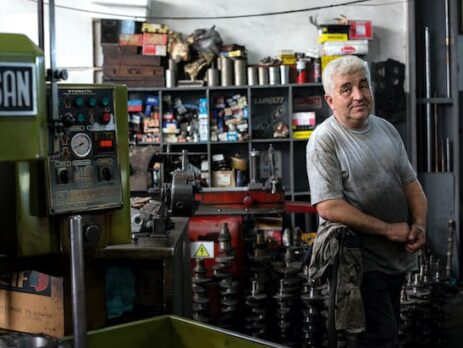How Family Businesses Have Changed Over the Years
The business world as a whole was built on the idea of family businesses that stemmed from one person in the family and reached out to generations. Many of these businesses can move forward in the modern landscape, but others are not that lucky.
The idea of family businesses has the right mindset of building something for future generations. However, those businesses that tend to make it are the ones that adapt to changes that are necessary for survival.
Wondering just how family businesses have changed over the years? Keep reading to find out.
What Defines a Family Business?
When it comes to defining what a family business is, it typically can mean several different things depending on the individual company. In the most traditional sense, a family business is owned and operated by family members only.
Of course, as time goes by, there may be times when other employees outside of the family come on board to fill various roles. These roles are often considered to be lower level, leaving the leadership of the company to family.
How Do Family Businesses Thrive?
Most family businesses tend to stay intact due to the way they approach the business as a whole. This typically means building the company from the ground up the way they want it done and embracing their family values and desires.
Family businesses that have lasted for multiple generations have done so through the knowledge and traditional methods that they pass down to each generation. Although many of the conventional methods stay intact, many business owners realize that specific improvements have to take place to stay competitive.
Creating a family business that will stand the test of time comes from being able to see the big picture of not only the present but also by embracing what the future holds. Instilling this belief in other generations is what makes family businesses thrive and last over the long haul.
Importance of Change in Family Businesses
To thrive in the business world, companies must be willing to embrace changes along the way. Whether the changes be to the way certain areas operate or the regulations that come with it, there are always adjustments that need to be made.
For companies to continue to grow over time, they must be willing to make certain changes and continue to innovate to stay competitive. This is especially true for family businesses that desire to stay in the game for generations to come.

Ways Family Businesses Have Changed Over the Years
Family businesses as a whole have changed in many ways over the years. In the past, these types of businesses were known for being rigid in the way the company operated and managed.
Over the years, however, those businesses that have survived more than two generations are those that have their hand on the pulse of the business world. This means that they are not too proud to listen to those icons who have set the bar high.
When a family business is willing to listen to others on how a business should operate and other types of leadership advice, they tend to thrive. The dream of passing their company on to the next generation can only be achieved if they are willing to change their rigid thinking.
Are you curious about how family businesses have changed over the years? Read on to learn more.
Social Responsibility
One area of business that has become vitally important through the years is the responsibility that everyone has to the world as a whole. This means that some of the old ways of doing things may not fit in today’s business landscape.
Many older business owners were able to grow their companies through any legal means that were possible at the time. At times, this meant doing things that may not have been as good for the environment as they could have been.
Today’s generation of business leaders, however, think more about their carbon footprint and the impact their businesses have on the world around them. This is why there has been a push for business owners to be more socially responsible.
Family businesses that are aware of this change in thinking often do their part to make changes in the way their companies operate. In most cases, this means that they may have to rethink their values and purposes and make changes that reflect this thinking.
Technological Advances
To say that technology has changed the way most companies do business is a gross understatement. This is because there have been many technological advances that have proven effective in the business world.
While many of the older family businesses in various industries began without much of the technology that exists today, many find that they have to pivot to stay afloat. To be competitive in most businesses, owners and other leaders have to embrace changes to technology that can streamline various aspects of the company.
Because of the many technological advancements that exist and will continue to come up in the future, family businesses have to adapt. Those business owners that do this are more likely to continue growing their businesses for the foreseeable future.
The Global Market
In today’s consumer market businesses must have a longer reach than ever before since more and more are crossing international borders. As previously stated, technology has advanced to the point where businesses are not limited to where they are located.
The traditional family business is based on having a local brick-and-mortar location that is the hub of the company. Not only are they based on location, but are also built through customer loyalty that keeps the business going in the long term.
These family businesses, however, have had to adapt in recent years when customer loyalty became less of the norm. Businesses once again had to pivot to reach out to new consumers outside of their small little world.
Not only have family businesses had to embrace doing more business across international borders, but they have also had to hire outside of the family to support this. Oftentimes, family companies that do business globally have to hire talent that has the experience and is located elsewhere as well.
Innovative Advertising
Word-of-mouth advertising has worked for many years for most family businesses to build the business and drive in new customers. Along with customer loyalty, those satisfied with the services or products will often recommend these companies to others.
As the various industries continue to change, there is a greater need for outside-the-box thinking when it comes to advertising. This often means that the old way of doing business and advertising may no longer work.
In this day and age, with various technological advances, social media has become the norm for many businesses. While many still use traditional advertising, they have had to embrace the use of social media to keep up with competitors.
Many family businesses have adapted well to the social media craze and are found on various platforms for their ad campaigns. This typically means that they have to bring on a social media manager who has the experience to help them maintain this new avenue of advertising.
The Outsourcing Phenomenon
Another way family businesses have had to change over the years is by reaching outside of the family for help. Outsourcing has become one of the best ways to get the reach that is needed in today’s business landscape.
Outsourcing can be used for anything from email management to social media management and many other areas in between. Companies that are attempting to stay competitive have to find a way to embrace this phenomenon especially if they do not have the skill sets needed.
For example, a company that has never maintained a website that comes equipped with a blog for customer information may need to hire someone to do just that. If no one in the company currently has this experience, they typically look to a freelance professional to meet the need.
While family-owned businesses try to maintain that the employees are only family, in today’s business world it may not be possible to stay this way. Keep in mind that many of these companies have maintained a family-run business at the head, they often have embraced hiring employees to meet other needs.
New Leaders
Even though the traditional family-owned businesses were focused on tradition and the same way of doing things for years to come, newer generations typically have different ideas. They are usually set on shaking things up which battles with the traditional methods.
When the newer generations of family come into the business, they often butt heads with the older generations because of the innovations they want to bring in. In most cases, these ideas are based on where the world economy is headed and would most likely be good changes.
Family businesses have had to adapt to allow these new generations to come in and make certain changes. This does not mean, necessarily, that the old way of doing things should be completely dismissed.
Many family-owned businesses have made adjustments to allow some changes to take place to appease the new generations while still holding on to some of the traditional ways. When this is accomplished, the business is more likely to grow exponentially.
Industry Changes
Over the years, through various innovations and other factors, industries tend to change or adjust to the current business environment. This often means that smaller businesses also have to make certain changes just to stay competitive.
Industry changes could mean anything from technology that makes the company run smoother, or new regulations that have to be implemented. Whatever the reason for the changes, companies have to stay apprised and make changes along the way.
Family-run companies may want to hold on to more traditional ways of doing things, however, if they want to stay in business, they have to make changes. Most of these companies have adapted to industry changes and have made the needed transitions to continue doing what they do best.
Overall Mindset
If you think about the mindset of the traditional family-operated businesses it has been one of a family-first environment. This is not necessarily a bad way of thinking since that is what the heart of the company thrives on.
Where the mindset changes come into play is with not what they do in the company but how they go about doing it. There has to be a mindset shift to embrace new ways of doing things so that the company can continue to grow.
Many family businesses have done just that while also keeping some of the family-focused mindset intact. Companies that adapt to these shifts will often continue to thrive in the newer business landscape.

What Happens to Family Businesses That Are Not Willing to Change?
Many people in the business world wonder what may happen to family businesses that are not willing to make the necessary changes to survive in today’s business environment. Many such businesses have seen what can happen by having to close their doors permanently.
Business owners who choose to stay rigid in their thinking often do not fare well amongst their competitors as a result. This means that if they are not willing to make the needed changes and adapt to new traditions, they may lose what is most important to them in the long run.
How Do Family Businesses Fare During a Crisis?
As seen through the recent pandemic, some family businesses can survive a crisis and others cannot. The biggest difference is those who are willing to pivot in the face of a crisis are more likely to thrive and come out the other side still intact.
Some studies have shown that through a crisis, family businesses tend to fare amazingly strong while other companies may be crumbling around them. This is mostly because they tend to have less at stake so can see ways they need to pivot much sooner than other competitors.
Ready to Make Changes in Your Family Business?
Now that you have seen many of the ways that family businesses have been able to not only survive but thrive through changes, you can use some of these methods to change your own family business. Although the fear of the unknown can be intimidating, your family-operated business may just come out on top.












